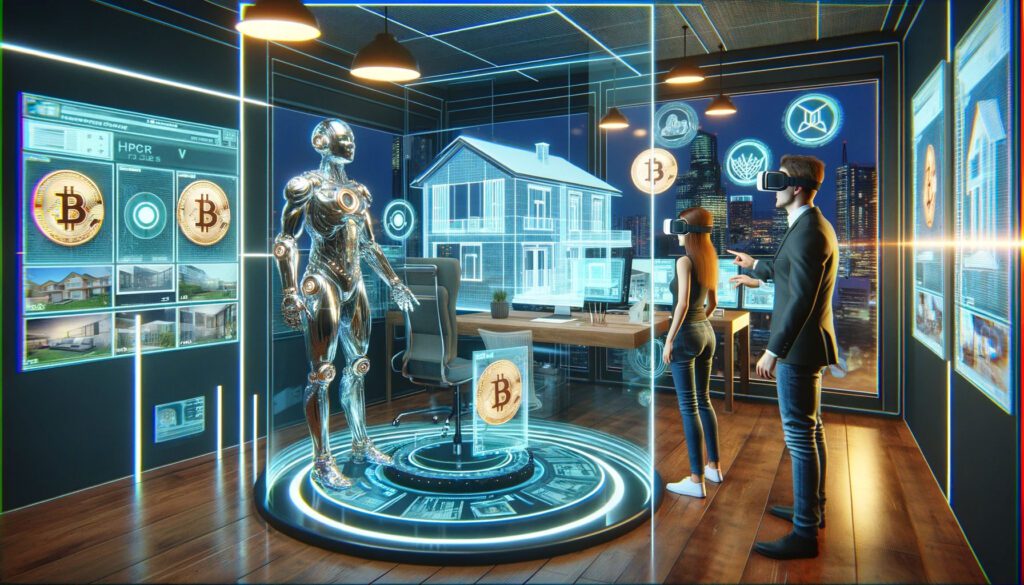In the dynamic world of real estate investments, technological innovations are reshaping traditional practices, offering new avenues for growth and efficiency with Innovation in Real Estate platforms.
Key transformative technologies like AI, blockchain, VR, and big data analytics play pivotal roles in developing new platforms for Innovation in Real Estate. That revolutionizes investment management and decision-making.
AI leads the change in real estate analysis. AI-powered platforms enhance how investors assess market conditions, predict trends, and value properties. These tools leverage vast datasets to perform complex analyses quickly—tasks previously taking days or weeks. This not only speeds up the investment process but also boosts accuracy, giving investors a competitive edge in fast-paced markets.
Blockchain technology brings unprecedented transparency and efficiency to real estate transactions. It facilitates secure, transparent property sales and management, reduces reliance on intermediaries, cuts costs, and minimizes friction points. Additionally, blockchain uses smart contracts to automate critical real estate transaction aspects, streamlining operations and minimizing disputes.
Innovation in Real Estate with virtual reality
Virtual reality also significantly impacts, especially in property marketing and sales. VR tours let investors and buyers remotely experience properties, providing a vivid, immersive view without physical visits. This technology saves time and expands the potential property market, reaching international investors who can now explore and assess properties from afar.
Moreover, crowdfunding platforms democratize real estate investment, opening it up to a broader audience. These platforms allow small investors to pool resources and participate in larger, potentially more lucrative projects. This approach diversifies risk and lowers the entry barriers to investment opportunities traditionally reserved for large investors or institutional entities.
Big data integration into real estate refines investment strategies by analyzing patterns and correlations within large datasets. Investors gain insights to identify market trends and make more informed decisions, invaluable in a complex and variable market.
These technological advancements do not just alter individual aspects of real estate investment; they reshape the entire industry, offering more robust, efficient, and accessible investment methods. As these platforms evolve, they promise to enhance the attractiveness and potential of real estate as a key investment portfolio component, signaling a new era for investors globally.
Platforms to launch Innovation in Real Estate Investments
Developing innovation platforms in real estate that harness AI, blockchain, VR, and big data is complex but rewarding. The first step is identifying market gaps or opportunities where technology can significantly improve. For example, if streamlining property transactions is the goal, blockchain might be the focus due to its transparency and security enhancements.
Once the target area is defined, outlining the platform’s key features and functionalities is next. Whether enabling property visualization through VR, facilitating secure transactions with blockchain, or supporting data-driven decisions with AI, each feature must be meticulously planned to effectively address the identified needs.
Assembling a skilled team is crucial for such a high-tech venture’s success. This team should include software developers, data scientists for big data and AI platforms, blockchain experts if applicable, UI/UX designers, and real estate professionals providing industry insights.
Technology for Innovation 2.0
Choosing the right technology stack is also vital for Innovation in Real Estate Investments. Technologies like Python, TensorFlow, and big data platforms such as Apache Hadoop or Spark for AI and big data, Ethereum or Hyperledger Fabric for blockchain applications, and tools like Unity or Unreal Engine for VR functionalities might be suitable.
Developing a Minimum Viable Product (MVP) allows testing core functionalities and gathering early user feedback, invaluable in refining the platform without a large initial investment. This is followed by rigorous testing to ensure the innovation platform in real estate is robust, integrating user feedback into the development process for iterative improvements.



